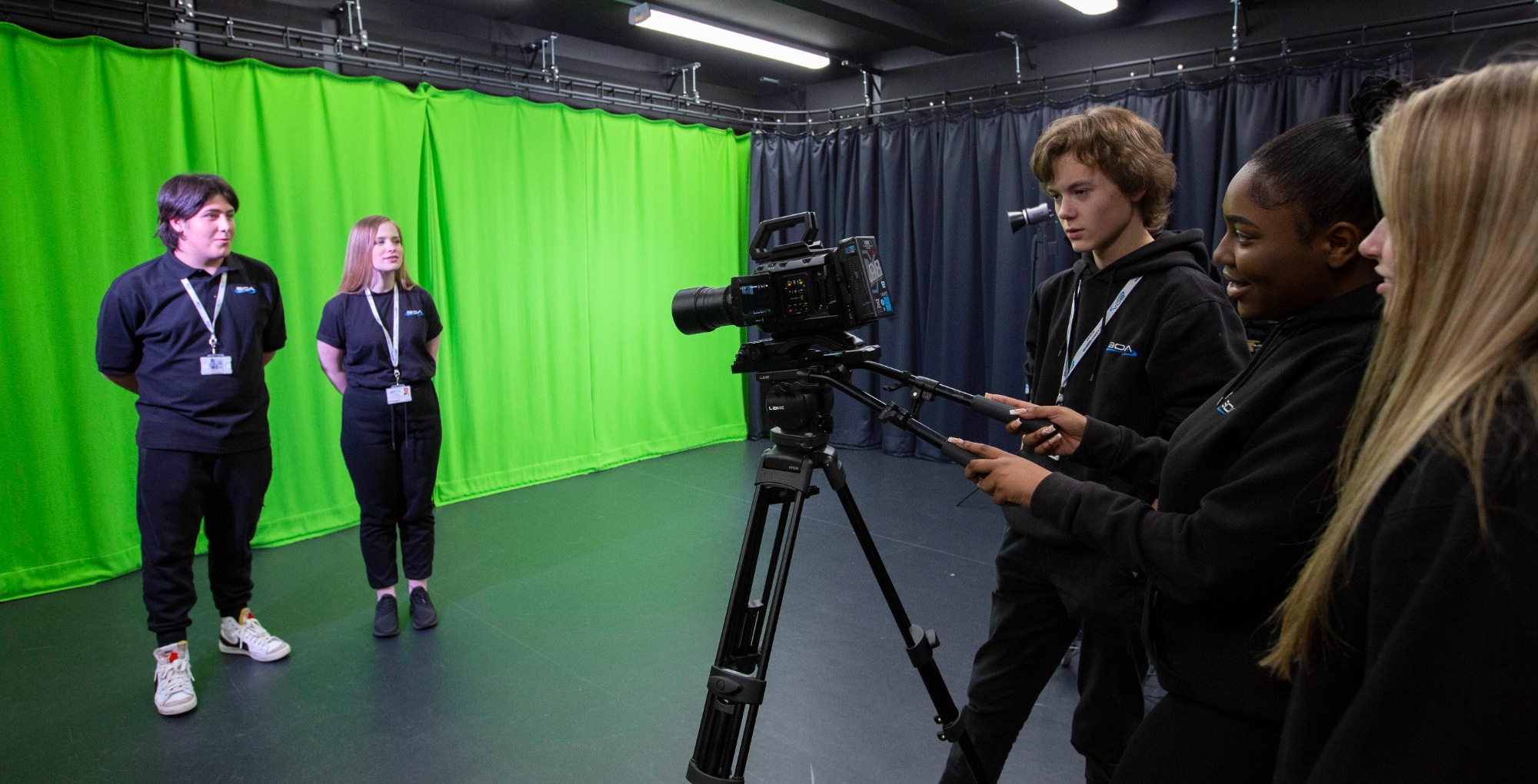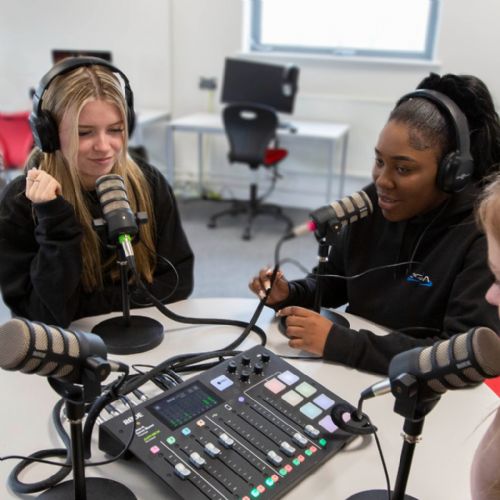Broadcast, FIlm & Content creation
Want to work across areas such as TV, film, radio, podcasting, social media, live motion capture or virtual production? Or are you interested in the technical operation of cameras, lights, sound gear, SFX, streaming decks, vision mixers, smoke machines and automation?
Our BROADCAST, FILM & CONTENT CREATION course prepares young people to progress into the screen industries.
This free post-16 course is underpinned by the Pearson BTEC Level 3 Extended Diploma in Creative Media Practice, worth the equivalent of 3 A-levels (up to 168 UCAS points).
This is a full-time 2 year course.

At BOA Stage and Screen Production we place significant emphasis on work-readiness, project based learning and industry collaboration, and our purpose-built curriculum has been designed in collaboration with major UK industry partners to ensure our students are genuinely "set-ready" when they leave us. The Broadcast, Film and Content Creation course at BOA Stage and Screen Production academy is much, much more than the BTEC course alone, it is a passport into the industry.
During the course, students will undertake a number of live industry projects, working with major partners such as the BBC and Method in Motion. Gaining experience across a range of technical and production roles, attending relevant workshops and classes, executing their duties, and keeping a journal and e-portfolio as evidence. For example every year our Year 13 students make a full commercial feature film, working with the team from Threewise Entertainment!
The content of the journal and e-portfolio is regularly assessed against the BTEC Level3 Extended Diploma in Creative Media Practice, worth the equivalent of 3 A-levels.
Students will achieve the Foundation Diploma (worth 1.5 A-levels) at the end of their first year of study. They will then have the option to ‘top-up’ their BTEC to an Extended Diploma (worth 3 A-levels) in their second year of study.
This means students leave equipped with the qualifications, credits, experience and professional network they need to progress directly into the industry, or pursue further studies at the very best universities.
WHAT WILL I STUDY?
This pathway covers the following subject specialisms:
- Film, television, video content, animation
- Virtual Production and Motion Capture
- Art Direction (mise-en-scene)
- Experience and social media
- Sound, podcasting and radio
- Graphics and photography
You do not have to study ALL of these areas, as this pathway enables you to tailor your own learning route. Meaning that you can choose to focus your studies on learning specific design, technical or management production roles, or you can combine a number of different roles from different areas.
This course provides learning experiences through which you will develop a wide range of skills required within the digital media sector. Through practical exploration and real-life media and film projects, you will develop and hone specialist design, creative, technical and management skills required to work successfully in this industry.
HOW WILL I LEARN?
You will develop essential industry knowledge and skills through a number of exciting projects led by industry professionals and Academy teachers. You will collaborate across pathways at BOA Stage and Screen Production Academy and will work closely with our sister school, Birmingham Ormiston Academy (BOA). You will work with directors, performers and other members of the production team to produce live performances and film projects.
You will be assessed through practical work on a variety of production projects and will be required to carry out coursework as part of your programme of study. Coursework is set in a variety of different ways at BOA Stage and Screen Production Academy. For example, you may decide that developing a website is the best way to showcase your skills. Other options for assessment could include an e-portfolio, presentation, video log or podcast. There are no formal written exams on this course.
Over the duration of your studies you will build a multimedia portfolio and logbook that tracks all of your experiences, roles and projects, and evidences your outcomes. You will reflect on how successful you have been and ear-mark those experiences which have been most useful. At key milestones throughout the course your portfolio will be assessed by authorised assessors based at the academy.
HOW IS THE COURSE STRUCTURED?
Foundation Year (Year 1)
Exploring and Developing Creative Media Skills
When studying Module A in year 12, you will take part in a wide range of workshops and industry projects.
By completing these projects and workshops you will learn about:
|
|
Extended Year (Year 2)
Advanced Creative Practice
When studying module B in year 13, you will lead on developing your own professional media projects in response to set client briefs. By completing these projects, you will develop your:
- Professional skills for personal progression
- Professional skills for creative practice
- Communication skills for progression
- Communication skills for creative practice
WHAT CAN THIS LEAD TO?
We have chosen to deliver the BTEC level 3 Foundation/Extended Diploma in Creative Media Practice because the BTEC Level 3 Diplomas are widely recognised by industry and universities alike as the ideal vocational training route into technical stage and screen careers.
Students who graduate BOA Stage and Screen Production Academy with this qualification will be well equipped to pursue careers in film, television, video, sound, experience (VR, AR, 360), visual communication, digital media, marketing & promotion, live media events, and other technical media-related disciplines.
Following successful completion of their course students may choose to transition straight in to full time employment in entry-level specialist roles, or they may choose to secure a higher apprenticeship or even go on to university.
Direct to Employment
The content, structure and assessment of this qualification have been developed in consultation with teachers, employers, professional bodies and academics to ensure that the qualification supports progression to higher education and, should learners choose to enter employment directly, that it is appropriate and consistent with current practice.
There are many, many careers working in the screen industries across the UK, in particular with the Midlands and Birmingham industry growing rapidly at present. The industry is crying out for young people who are 'set-ready' and keen to get ahead.
University & Higher Apprenticeships
The Extended Diploma, equivalent to three A Levels, is a two-year, full-time course that meets entry requirements for learners who want to progress to higher education courses in creative media areas before entering employment.
BOA Stage and Screen Production Academy has close partnerships with many of the leading UK Film Schools and Broadcast Higher Education Providers and Universities, such as Falmouth University, Bournemouth, London Film Academy, and the Birmingham Screen and Film School.
CAREERS IN THE INDUSTRY
Careers in the screen industries can take many different forms, with hundreds of individual roles - each with their own specialisms and skills.
For a comprehensive list of over 500 roles, why not check out the ScreenSkills Job Profile Finder
Freelance Work & Portfolio Careers
Technical staff and crews tend to work on a freelance basis, moving from project-to-project on contracts lasting anywhere from a few weeks to several years. As a result, many workers in the industry will build up a 'portfolio' of skills, allowing them to work flexibly across different roles and therefore increasing the availability of projects available to them.
Ultimately, the variety and excitement of a career in the screen industry is second to none, but of course making connections and building a robust professional network is key. That is why we ensure every student graduates BOA Stage and Screen Production Academy set up with a freelance portfolio, professional film and TV credits, and key connections in the Birmingham industry network.
Permanent & Fixed Term Contracts
Management and production teams are more typically hired as permanent or fixed-term contracts. Similarly, in the world of marketing and social media, roles can be permanent positions either within an organisation or through an agency.
It's also worth noting that there are a huge number of creative roles offered within traditionally 'non-creative' industries. Across the globe, sectors such as healthcare, engineering or banking & finance all require creative workers for the creation and production of marketing materials, PR & communications, social media channels, websites, events and branding.
Salaries
As with many industries, pay can vary significantly across the whole spectrum depending on the level of responsibility and also the size/budget of the overall production/project. However, creative and technical workers are usually highly sought after and can typically expect to receive higher levels of pay - due to the specialist nature of the skills required.
Ultimately, the variety and excitement of a career in the screen industry is second to none, but of course making connections and building a robust professional network is key. That is why we ensure every student graduates BOA Stage and Screen Production Academy set up with a freelance portfolio, professional film and TV credits, and key connections in the Birmingham industry network.
Apply now for our
Broadcast, Film & Content Creation Pathway


